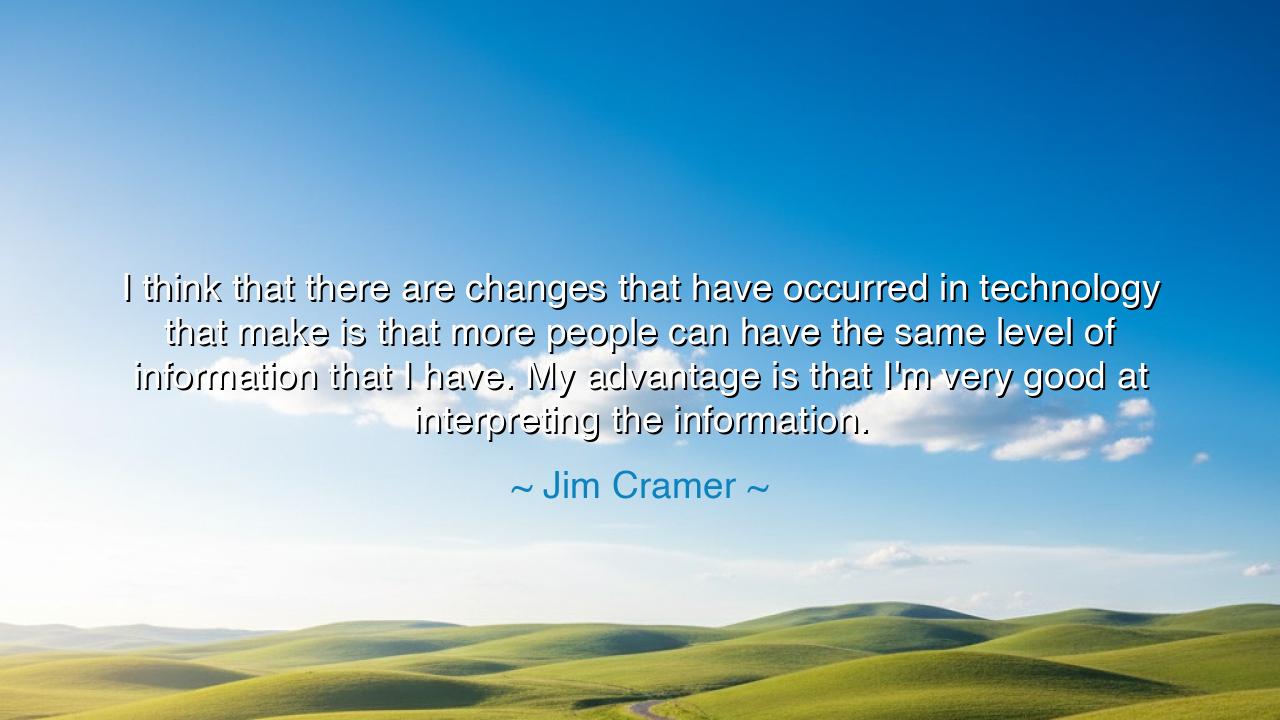
I think that there are changes that have occurred in technology
I think that there are changes that have occurred in technology that make is that more people can have the same level of information that I have. My advantage is that I'm very good at interpreting the information.






Hear now the words of Jim Cramer, who gazed upon the new world of knowledge and spoke with both caution and confidence: “I think that there are changes that have occurred in technology that make it that more people can have the same level of information that I have. My advantage is that I’m very good at interpreting the information.” These words are a testament to the age in which we live, when streams of information flow freely to all, yet wisdom still remains rare.
He begins by acknowledging the great change: technology has made information abundant. Where once the scrolls of knowledge were guarded in temples, where once only scholars and nobles had access to learning, now the common man may summon the data of the world with a single touch. The advantage of the few, who once reigned by secrecy, has vanished. Now, the treasure of knowledge lies open before all who seek it.
Yet, Cramer reminds us, the abundance of information is not the same as the possession of wisdom. For knowledge unguided is like a sea without a map—many may sail upon it, but few can navigate its currents. His strength, he declares, lies not in having access to the data, but in his gift of interpretation—the ability to see through the noise, to discern patterns, to understand meaning where others see only numbers and words. This is the difference between the scribe who copies letters and the sage who reads their truth.
History bears witness to this eternal divide. In the days of Greece, all men could hear the debates of the agora, but only Socrates could pierce through them with questions that revealed truth. In the Renaissance, the printing press gave books to the many, but it was Leonardo da Vinci who could interpret the knowledge of art and science into inventions centuries ahead of his time. So it is in every age: access to information multiplies, but the gift of understanding remains rare, precious, and powerful.
Cramer’s words also carry a challenge for all who live in the Information Age. Do not be content merely to gather knowledge, to hoard facts, to memorize the surface of things. The true mastery lies in interpretation—in asking what the knowledge means, how it connects, how it can guide action. The flood of data threatens to overwhelm, but the wise stand above it, discerning signal from noise, truth from illusion. This is the art that separates the multitude from the master.
Think of the traders of ancient marketplaces. Many could see the prices of grain, the movements of caravans, the whispers of rumor. But only a few could read these signs well enough to know when famine loomed, when opportunity called, when danger approached. These interpreters of signs became leaders, for they did not merely gather information—they made it live, they made it useful. Such is the essence of Cramer’s insight.
The lesson is clear: in our time, knowledge has been democratized, but wisdom has not. Do not think that access alone makes you wise. Train yourself in the art of interpretation. Learn to question, to connect, to apply. Practice discernment: do not swallow all information as truth, but test it, weigh it, and understand its meaning. In this way, you will rise above the ocean of noise and find the clear waters of wisdom.
Thus, Jim Cramer’s words resound with ancient power: technology has given all men the tools once reserved for kings and scholars, but only those who cultivate interpretation will wield them with strength. Let this be your guide: seek not only to know, but to understand; not only to gather, but to discern. For in the end, it is not information that shapes destiny, but wisdom.






AAdministratorAdministrator
Welcome, honored guests. Please leave a comment, we will respond soon